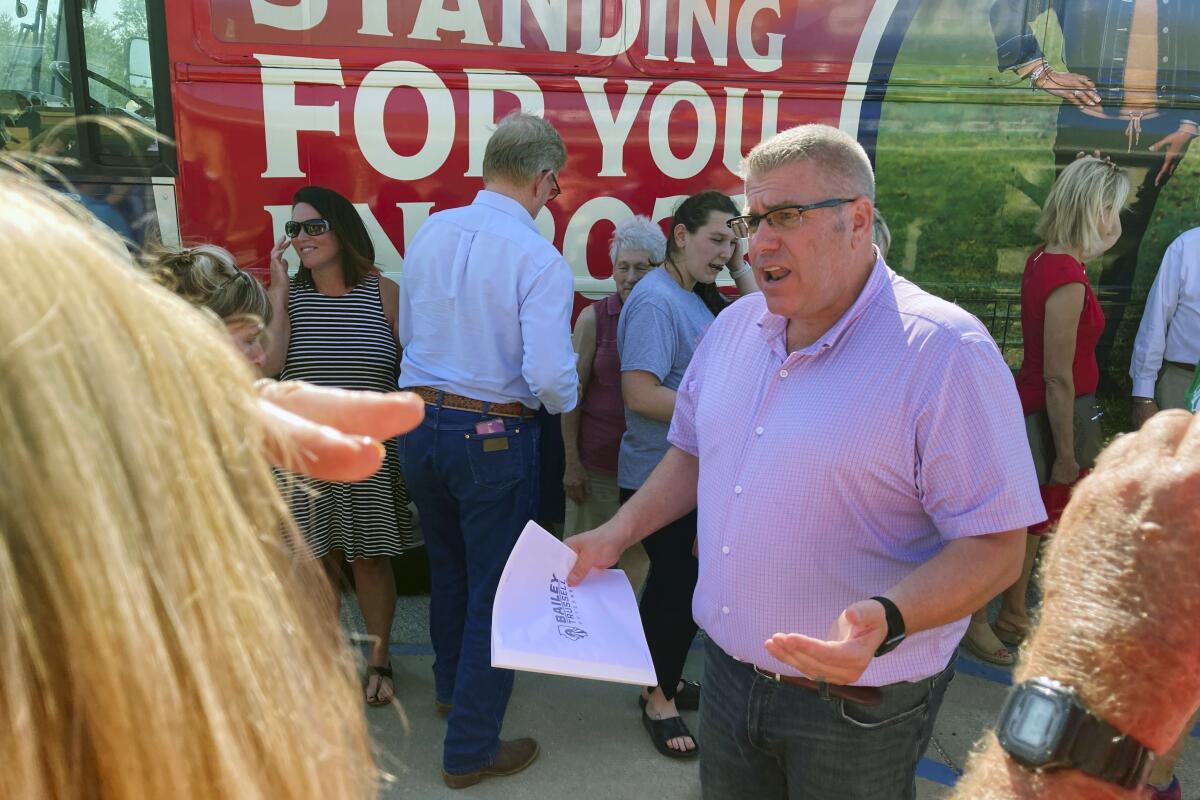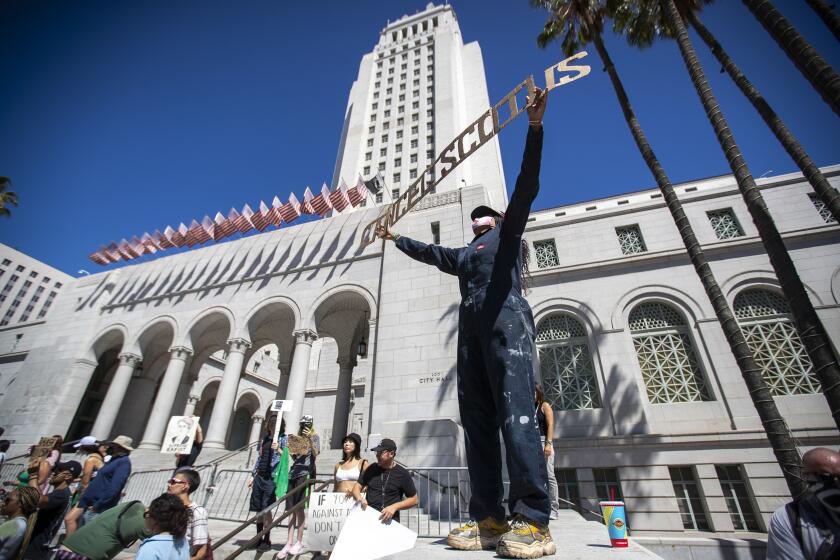Illinois governor’s race is also battle among billionaires

- Share via
WAUCONDA, Ill. — The race to be Illinois’ next governor is also a battle among billionaires, including two whose names won’t appear on Tuesday’s primary ballot.
Republican candidates Darren Bailey, who as a state lawmaker fought pandemic measures such as mask mandates, and former prosecutor Richard Irvin, the first Black mayor of Chicago’s largest suburb, each has a benefactor who has pushed a different vision for the GOP and put their money behind it.
Billionaire businessmen Ken Griffin and Richard Uihlein — among the country’s biggest Republican donors — have combined to pour more than $60 million into the race. Griffin backs Irvin and Uihlein supports Bailey.
Billionaire Democratic Gov. J.B. Pritzker, meanwhile, along with the Democratic Governors Assn., has spent millions trying to ensure Irvin, an Army veteran and Aurora mayor, isn’t the GOP nominee.
Hundreds of protesters gathered Saturday in downtown L.A. to denounce the Supreme Court’s decision to end a constitutional right to abortion.
The money has funded a months-long barrage of ads that have attacked Irvin and propped up Bailey, the opponent Pritzker would rather face in November. The ads note Bailey’s strident far-right positions, including being “100% pro-life,” and his allegiance to former President Trump — qualities that may help Bailey in a Republican primary but would be a liability for a general election in a state Trump twice lost by double digits. Trump endorsed him at a rally Saturday night in Mendon.
Although rich men in politics certainly aren’t rare, there may never have been a battle of the billions to match this one in a state election, particularly in a primary. It’s left Irvin, once considered the front-runner, scrambling to convince GOP primary voters that he’s the only one who can beat Pritzker.
“J.B. Pritzker is telling you that every time he takes out an ad. He’s telling you that ‘This is the guy I’m the most most afraid of,’” Irvin said during a stop at an Illinois manufacturing plant.
Irvin’s downfall may be a record that is considerably more moderate than that of his GOP rivals. Unlike Bailey and the four other men in the race, Irvin avoids saying if he voted for Trump or talking much about issues such as abortion, focusing instead on steps he would take to reduce crime and taxes. He has been criticized for saying, “Black Lives Matter,” during protests over police brutality that turned destructive in his hometown, then filming a TV ad where he said, “All Lives Matter.”
Bailey has built a reputation during three years in the Legislature as an uncompromising conservative unafraid to take people on.
“People say J.B. Pritzker wants me to win this primary because he believes that I’m the easiest opponent to beat,” Bailey said during a campaign stop at a restaurant. “Well, I’ve got news for J.B. Pritzker: Be careful what you wish for because it’s coming. Friends, we’re going to win on Nov. 8.”
Bailey, a farmer from rural Xenia, jumped onto the statewide scene in summer 2020, during the height of the COVID-19 pandemic, when he filed a lawsuit against Pritzker over a stay-at-home order the governor issued to slow transmission of the virus. Bailey was seen by supporters as a maverick when he was escorted from the floor of the Legislature for refusing to wear a mask in defiance of Democratic leaders. His backers like that he speaks often of his faith. Bailey, who speaks with a prairie twang, ends his nearly daily online video messages with prayer.
“He’s a godly man. He isn’t afraid to put his faith out there,” said supporter Ruth Bast, 63, of Springfield.
The three billionaires — Pritzker, Griffin and Uihlein — have a long history of clashing politically in Illinois and elsewhere.
Griffin, the founder and CEO of hedge fund company Citadel, has been a vocal critic of Pritzker’s administration, particularly over the issue of crime in Chicago. In addition to the $50 million he gave Irvin this cycle, he also spent millions to help get former Gov. Bruce Rauner elected in 2014 and on Rauner’s loss to Pritzker in 2018. He bankrolled a successful campaign to block Pritzker and other Democrats from changing Illinois’ tax structure to levy more on the highest earners.
In 2020, Griffin gave $37 million to the GOP’s Senate campaign arm, making him the PAC’s second-largest individual donor, according to OpenSecrets, which tracks campaign spending.
Asked at a forum last year if he would support Trump should he run for president in 2024, Griffin replied, “I think it’s time for America to move on,” adding that Trump had been “pointlessly divisive.”
In a statement to the Associated Press, Griffin criticized Pritzker for “interfering” in the GOP primary, saying, “spending tens of millions of dollars in cahoots with his cronies attacking the most successful Black political leader in Illinois is despicable.” Pritzker has defended his actions, saying an ad attacking Irvin is “telling the truth.”
Uihlein, a founder of the office supply company Uline Inc., is a major Trump supporter who has a long record of donating to far-right candidates and groups. That includes PACs and people strongly opposed to abortion, and the House Freedom Fund, which backs the most conservative candidates and strongest Trump backers.
The other candidates seeking the GOP nomination are businessman Gary Rabine, venture capitalist Jesse Sullivan, former state Sen. Paul Schimpf and attorney Max Solomon. Pritzker’s only rival in the Democratic primary is Beverly Miles.
More to Read
Sign up for Essential California
The most important California stories and recommendations in your inbox every morning.
You may occasionally receive promotional content from the Los Angeles Times.











